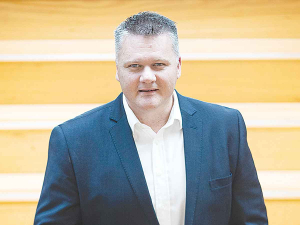Fonterra’s exit from Australia ‘a major event’
Fonterra’s impending exit from the Australian dairy industry is a major event but the story doesn’t change too much for farmers.
 Fonterra chief executive Miles Hurrell says the co-op will soon set Scope 3 targets which cover indirect emissions from its farm suppliers and account for more than 90% of its tally.
Fonterra chief executive Miles Hurrell says the co-op will soon set Scope 3 targets which cover indirect emissions from its farm suppliers and account for more than 90% of its tally.
Fonterra will shortly be introducing a Scope 3 emissions target, which will seek to reduce emissions intensity on supplying farms.
Chief executive Miles Hurrell told the International Dairy Federation's world dairy summit in Chicago last month, working with farmers to collectively achieve this goal is imperative for the co-op.
"We already provide farmers with insights reports which detail their individual farm's greenhouse gas emissions," he says. "By knowing where their emissions come from, farmers can see where they need to take action on farm."
Fonterra's plan to introduce a Scope 3 emissions target was first announced at its annual general meeting one year ago.
The co-op had initially planned to release the target around June. However, the co-op delayed it by six months after pushback from farmer shareholders, already under pressure from rising interest rates, soaring farm input costs and lower farmgate milk price.
Fonterra claims it is facing pressure from overseas markets, big customers and banks to improve sustainability. While the co-operative has been reducing its Scope 1 and 2 emissions, generated primarily by its manufacturing sites and transport operations, it hasn't yet set a target for Scope 3. These cover indirect emissions from its farm suppliers and account for more than 90% of its tally.
Fonterra claims New Zealand's pasture-based farming model produces low carbon dairy with a footprint one third the global average. Hurrell points out that despite this natural advantage, they're always looking to improve, so that the co-op can continue to meet the needs of customers, regulators, and financial institutions.
"But we also know that finding a solution to methane will be a huge unlock for our farmers' emissions profiles. Agriculture makes up almost half of the New Zealand's domestic greenhouse gas footprint, so we know as an industry and a country we must find a solution."
Hurrell says any methane solution must do four things - it must be good for the cow, good for the milk, good for farmers, and of course good for the planet.
He adds that it is no easy task, but the co-op can achieve more through partnering with others. One of these partnerships is between New Zealand agri-industry and Government, in a Joint Venture called AgriZeroNZ. Over the next three years around $165 million has been committed to accelerate the development of emission mitigation tools and technology through targeted emissions.
Fonterra’s impending exit from the Australian dairy industry is a major event but the story doesn’t change too much for farmers.
Expect greater collaboration between Massey University’s school of Agriculture and Environment and Ireland’s leading agriculture university, the University College of Dublin (UCD), in the future.
A partnership between Torere Macadamias Ltd and the Riddet Institute aims to unlock value from macadamia nuts while growing the next generation of Māori agribusiness researchers.
A new partnership between Dairy Women’s Network (DWN) and NZAgbiz aims to make evidence-based calf rearing practices accessible to all farm teams.
Despite some trying circumstances recently, the cherry season looks set to emerge on top of things.
Changed logos on shirts otherwise it will be business as usual when Fonterra’s consumer and related businesses are expected to change hands next month.

OPINION: Here w go: the election date is set for November 7 and the politicians are out of the gate…
OPINION: ECan data was released a few days ago showing Canterbury farmers have made “giant strides on environmental performance”.